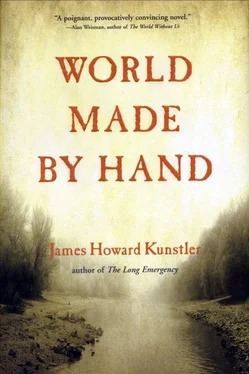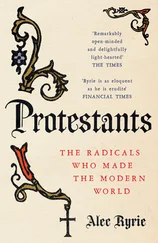We didn’t use bicycles much anymore-rubber tires being unavailable, not to mention the poor condition of the pavements. For many ordinary chores, therefore, I was what we all jokingly referred to as a foot cowboy. I had a small wooden tote wagon that I’d built for my toolbox, which I’d left on the job over at Prager’s. I dreamed all the time about getting a horse, almost as much as when I was a six-year-old boy. They couldn’t breed them fast enough, and they were still very costly. You could rent one from Tom Allison here in town: saddle horse or horse with a rig, if you needed to transport something bulky or go visiting with your family. Anyway, I set off that day on foot with my old backpack to carry the nails and things I needed from the general. The sawmill would send my wood down by wagon after I went by and ordered and paid for it.
Out in the dooryard, I heard the distant clip-clop of hooves on pavement, and then I saw a wagon glide up Salem Street toward where the high school had been. That was the extent of the traffic. The tranquillity was pleasing, despite what it signified about what had happened to our society. You could tell it was going to be a hot day. A gauzy haze already hung over the sun-struck little town. The birds sounded discouraged.
Mrs. Myles, my neighbor, was outside firing up the immense copper tub that she used to do the laundry she took in. Her given name was Lucy, and she had been an English teacher in the high school, which was no more. She had lost her husband, Dexter, as I’d lost Sandy, from the encephalitis. He had been the Washington County family court judge. Since she was at least seventy years old, and was used to being addressed a certain way by children, everybody called her Mrs. Myles rather than Lucy. I’d helped her out by constructing her laundry system, a drywall fieldstone hearth under the tub, and the pipe system, and two long pine tables for sorting and stacking things, and the pavilion that sheltered it all from rain and snow. We’d run the gray-water drain pipe out of the copper tub and into the ground across the yard to her substantial patch of currents and gooseberries. She was an excellent gardener. Forty years ago she had been a Cub Scout den mother and member of the town zoning board. Back then, she went to the supermarket every week, like everybody else. She was never once cold or hungry until she was an old woman. She no longer knew where her children were or even if they were still alive.
“Want some eggs, Robert,” she called from across the fence.
“No thanks. Hey, the electric was on for a while just now.”
“Was it?” she said. “I don’t even notice anymore.”
“I’m going to the general. You want me to pick up anything for you?”
“I could use some mason jar lids.”
“I’ll ask.”
“You going up with the truck?” She meant my tote wagon.
“No. Not today.”
“All right.”
“Why?”
“I could use a couple more buckets. Tin, plastic, whatever they’ve got.”
“I’ll get you some real soon.”
“Peas are coming in like gangbusters.”
“That’s good.”
“You get me a nice trout, we’ll be in hog heaven.”
“I’ve got two smoking up right now.”
“I like ’em fresh, fried in butter.”
“Okay. Will do. You have a nice day now, Mrs. Myles.”
“You stay out of trouble, Robert.” She said that to me every time I said goodbye to her. I suppose that was what she used to tell her kids back in school.
In a world that had become a salvage operation, the general supply evolved into Union Grove’s leading industry. When every last useful thing in town had been stripped from the Kmart and the United Auto, the CVS drugstore, and other trading establishments of the bygone national chain-store economy, daily life became a perpetual flea market centered on the old town dump, which had been capped over in the 1990s. The general was run at first as a public cooperative, under the illusion that the ongoing catastrophes would ebb and normality would return. But the flu and the bombing of Washington put an end to that illusion, and the general eventually came under the management of Wayne Karp and his gang of former motorheads.
In the old days, Wayne Karp worked as a trucker for the Holland and Vesey paper mill in Glens Falls. Sometimes he hauled loads of pulpwood down from Saranac. Sometimes he took giant rolls of machine-finished magazine paper from the H & V plant to the big web-offset printing operation in Schenectady where regional editions of Newsweek were run off. In his leisure time, Karp was addicted to sporting entertainments that required gasoline engines: motorcycling, motorboating, snowmobiling, off-roading, jetskiing, and watching NASCAR racing on television. He couldn’t relax unless an engine was roaring somewhere near his head. He lived four miles outside Union Grove in a former trailer park near the general supply along with about a hundred like-minded former motorheads, greasers, bikers, quasi-criminals and their families who had drifted in over the years.
In normal times, Wayne Karp would have passed through life as just another lumpen American Dreamer, a hardworking con sumer of shoddy products, chemically tweaked foods, and rude popular entertainments, a taxpayer subject to the ordinary restrictions of the social contract. But in the new era, he blossomed into a local kingpin.
He was married for some years to a barmaid from a now defunct tavern called Waterhole No. 3, which occupied the even longer defunct Boston and Maine train station. The barmaid earlier had a son out of wedlock with a guard from Comstock State Prison up at the northern end of Washington County. The guard ended up incarcerated in his own joint for selling heroin to the inmates. Wayne Karp raised the child. This stepson ended up in Comstock himself at age nineteen for stabbing to death another teenage boy one summer night at the quarry outside town where kids gathered to drink and hook up with girls. His was one of the last cases tried in the county criminal courts. A month later, flu swept through Comstock prison and killed seventy percent of the inmates, including the stepson and his natural father. Wayne’s wife died under mysterious circumstances a year later. By then the justice system had ground to a halt like so many things that had once seemed woven into the fabric of regular life. The rumor was that Wayne strangled her in their trailer. He had more or less bragged about it openly. The phrase with his bare hands always seemed to crop up whenever you heard someone whispering about it.
As well as taking over the general supply, Wayne Karp had for a while organized the drug trade in Washington County, meaning marijuana-because manufactured pharmaceuticals, and anything linked to them, like methedrine made out of cooked cough syrup residue, had ceased to exist. At the onset of the hard times quite a few people had begun growing pot, to have something to trade, to simply survive. It was a form of currency, like eggs. After a while, if Wayne Karp learned that you were growing, he would demand an exclusive “contract” on your crop on terms very favorable to himself. Those who resisted or cheated had unpleasant things happen to them. But after a few short years, Wayne lost control of the dope trade. So many people were growing so much weed that the stuff became valueless as a means of exchange, no matter how the traffic was organized. Wayne himself was even growing it in quantity, queering his own market. Then, it started showing up wild all over the place, in the hedgerows and roadsides. I had sowed plenty of seeds myself up along the old railroad tracks by the river. It was a hardy and potent low-growing, shaggy Afghani strain of cannabis that was now naturalized in our corner of the world like the orange daylily. It put out buds the size of plums.
Читать дальше












